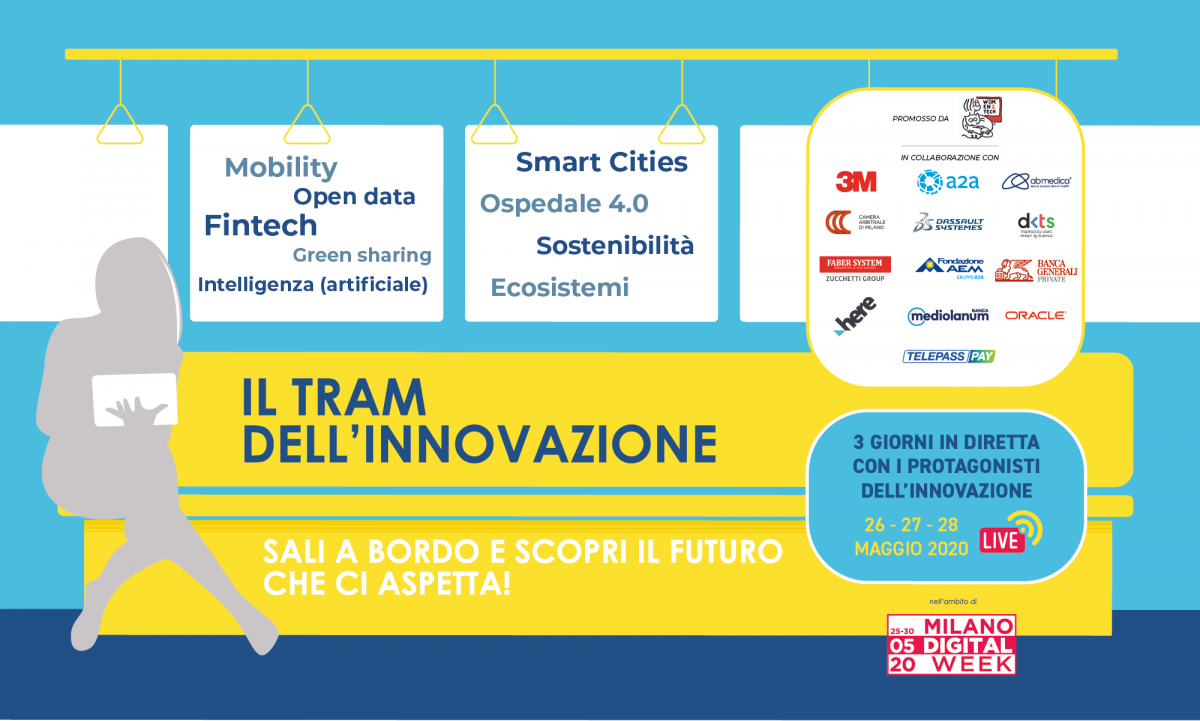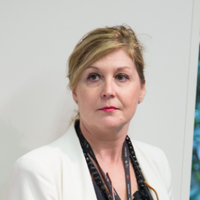
Women & Tech-Association Women and Technologies renews, for the third consecutive year, its presence at the Milan Digital Week, giving life to "The Innovation Tram" in digital version.
With the payoff "Don't miss the digital tram... for real" , this year too the Association led by President Gianna Martinengo invites citizens to reflect on digital issues, not on the historic Milanese tram, but online (so will also be the entire Milan Digital Week), to comply with the social distancing rules imposed by Phase 2 of the Covid-19 emergency.
This edition of the Tram will be dedicated to the sharing of open experiences (open innovation, open access, open source). The themes that will be addressed along the way will be: Mobility, Open Data, Fintech, Green Sharing, Intelligence (Artificial), Smart Cities, Hospital 4.0, Sustainability, Ecosystems. In addition, there will be interventions related to talents for the future (skills and start-ups).
Several new features accompany the third edition of the Digital Tram.
- The event will be broadcasted live for three days on Facebook and YouTube, in collaboration with the social channels of the partners involved. The videos will then be available on demand for those who wish to delve deeper into a particular topic.
- Important will be the tools that will be used to ensure two sessions in the morning and two in the afternoon for three days, all live, for a total of 12 hours of broadcast.
- The event will be moderated by Debora Rosciani, journalist for Radio 24 Il Sole 24 Ore. Users will be able to ask their questions to the speakers during the live broadcasts.
For information and questions to the speakers, write to info@donnetecnologie.org.
Review the live talks of the Innovation Tram
Below you will find recordings of all sessions. To select the session of your interest, simply click on the button.
 in the top right corner of the player.
in the top right corner of the player.
intervene






Program
Discover the full event schedule, session times, topics, and keynote speakers.
Milan Chamber of Arbitration
Nicola Giudice - Mario Dotti
The search for sustainability finds a very strong ally in mediation, because sustainability means balancing interests and making objectives complementary. This can only happen through effective dialogue, careful listening to mutual needs, and a shared search for efficient and practical solutions for everyone. If a tool had been designed in the laboratory to "create" sustainability, the result would probably have been mediation. Sustainable choices also concern the present, especially in the current health emergency. Contracts to be renegotiated, commercial relationships to be cared for, problems to be solved, new paths to be found. Innovation is needed, and quickly. The situation we are experiencing today teaches us that innovation is not only something that is sought, but that we may also find ourselves suddenly having to manage it. Mediation can be an efficient and immediate response, and it can also be thanks to digital technology.Mariagrazia Del Vescovo , Here Technologies, Channel Sales Manager, Automotive
Lara Ferraro , HERE Technologies, Senior Local Data Intelligence Analyst
Simone Marchetti, Oracle, Director of Business Development Digital Supply Chain
HERE Technologies and Oracle. Two important technological innovation companies committed to creating solutions and services that help improve the lives of citizens and the business of companies. At the core of their strategies are data, the DNA of any type of digital innovation. Who are the two companies and how do they produce, manage, and use data while respecting security and privacy, and how do these data contribute to creating useful tools even in critical periods and situations, always with a focus on sustainable mobility.
Donato Luongo, Account Manager Executive, Faber System
How digital transformation of critical business processes, such as invoicing, management of delivery notes, personnel records, etc., not only increases efficiency and competitiveness of companies, but also significantly contributes to sustainability by reducing paper consumption, enabling collaborative work without the need to travel, and exchanging contractual documents with electronic signatures remotely.
Greetings from Professor Alberto Martinelli , President of Fondazione AEM - Gruppo A2A
Luca Cavalletto, Asset Management Manager at Unareti
The distribution networks of electricity and gas are the backbone of all the services and activities that take place daily in the city. Their history is not recent, dating back to the beginning of the last century with the first electrifications and gasification of Milan. Over the years, the laying of "cables and pipes" has accompanied the growth and expansion of Milan, ensuring the evolution of the first true Italian Metropolis. This very rapid evolution has required operators to integrate all infrastructures in the best possible way, as we will see during our journey the important nodes of the networks, such as electrical and gas cabins, located near our homes and offices, but perfectly integrated to ensure minimal visual impact. In this important historical moment, in which there is increasing talk of energy transition, some examples will be given that describe how the networks (Smart Grids) will allow us to have a greener future by enabling technologies such as electric mobility (like the tram we are on), the use of biofuels, and even the possibility of storing energy produced by renewable energy production plants.
Professors Erik Brynjolfsson and Andrew McAfee of MIT coined the term 'Second Machine Age' in 2014 in their successful book describing the explosion of digital technologies and the significant consequences on global productivity, at least equivalent to the First Industrial Revolution. This led to the spread of technological buzzwords and acronyms with varying degrees of success: AI, IoT, Industry 4.0, Machine Learning, Big Data, ... but what is the core of this digital revolution beyond short-lived technological trends? Technological platforms are the answer, with their ability to democratize technology, spread it, and make it accessible outside the narrow hyper-specialized circles of elite universities and innovation centers. There are many cases like Canoo, Eviation, Lightyear that demonstrate how, thanks to the use of innovative Technological Platforms, small groups of highly motivated serial innovators can intercept new sustainability and resilience themes with unimaginable business models until a few years ago. Let's meet them together in a quick and 'reasoned' overview.
Sara Ricciardi, Researcher at the University of Pisa.
To date, lung cancer is the most common neoplasm and the leading cause of cancer death worldwide. The increasing technical and technological innovations have allowed the development and spread of minimally invasive surgical approaches in the treatment of this neoplasm, ensuring optimal oncological results for the patient with undeniable aesthetic and functional advantages. In particular, the robotic platform, which provides the surgeon with highly technological instrumentation and systems, allows for the minimally invasive execution of even complex procedures.









